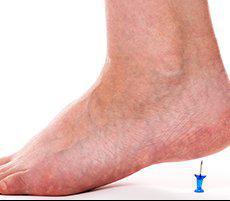
Without appropriate treatment, plantar fasciitis may be as hard to get rid of as it is to pronounce. Dr. James Ashford is a board-certified anesthesiologist and pain management specialist who can design a treatment plan that relieves the heel pain caused by this common foot ailment. Dr. Ashford and his team at Ashford Pain Solutions in Athens, Georgia, are widely respected for their dedication to uncovering the source of your pain and providing long-lasting solutions to the symptoms you’re experiencing. Call the office today to schedule your appointment or book your visit online.
Plantar Fasciitis Q & A
What is plantar fasciitis?
The plantar fascia is a band of tough, fibrous tissue that runs along the bottom (plantar) surface of your foot. It connects the heel bone to your toes and helps support the arch of your foot. Plantar fasciitis occurs when this band of tissue becomes inflamed and irritated, usually in the area nearest your heel.
The irritation and inflammation cause symptoms that most often present as stabbing pain in the heel that is typically at its worst when you get out of bed in the morning and take your first few steps. Left untreated, however, plantar fasciitis can lead to long-term heel pain and changes in your gait that can affect your knees, hips, and back.
What causes plantar fasciitis?
It’s often not clear why some individuals develop plantar fasciitis. There are some factors that do increase your risk of developing this condition, however, which may include:
- Exercise that places stress on your heels, such as running and/or jumping activities
- Age, most common from 40 to 60
- Structural abnormalities in the feet, including flat feet or excessively high arches
- Excess weight, which places extra stress on your plantar fascia
- Teaching, nursing, and other occupations that keep you on your feet most of the day
Ill-fitting shoes, high heels, shoes that are wrong for your sport, or walking barefoot frequently on hard surfaces can also inflame and irritate the plantar fascia.
How do you treat plantar fasciitis?
Effective treatment starts with a thorough exam and a detailed discussion of your symptoms. You can also expect Dr. Ashford to ask questions about your work habits, exercise routines, and other factors that may be contributing to your plantar fasciitis.
At Ashford Pain Solutions, treatments are customized to fit the needs of the individual. Your therapy may include:
- Ice and rest
- Medical massage
- Physical therapy/stretching and strengthening exercises
- Change in shoe gear
- Switching from high-impact sports or exercise to low-impact activities such as walking or swimming
- Night splints to stretch your arch, Achilles tendon, and calf as you sleep
- Medication or steroid injection to reduce inflammation and swelling
You can rely on Dr. Ashford to provide the most effective therapy available for plantar fasciitis. Call the office today to schedule an appointment or book your visit online.